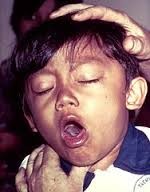
California is suffering what is being called the worst epidemic of whooping cough in 70 years. Almost 10,000 cases have occurred and one infant has died since January 1. Outbreaks have occurred at schools across the state.
Health experts are raising questions about the effectiveness of the vaccine against whooping cough that is currently being used. Whooping cough is also known as pertussis. The vaccine being used now replaced an older version in the 1990s that was taken off the market due to side effects. The current vaccine does not offer as much protection against the disease, but health officials are still urging people to be vaccinated. People who get infected with whooping cough after being vaccinated get less severely ill.
Although California has a relatively low vaccination rate in general, state health officials note that only 10% of those children who were infected whose vaccination history is known were not vaccinated against pertussis.
Last year, there were more than 48,000 cases of whooping cough in the United States. Eighteen people died. It was the worst year for cases of whooping cough nationally for more than 60 years.
Cases of whooping cough usually peak every 3 to 5 years and California health officials had been warning residents to be vaccinated since this was expected to be a peak year. The disease is a bacterial infection that causes violent coughing that is difficult to control and which can make it difficult to breath. People with whooping cough often take very deep breaths that cause a "whooping" sound. The uncontrollable coughing can last 6 weeks or longer. The coughing fits are so violent that sufferers have broken ribs from the coughing, broken blood vessels in their eyes, fainted, or started vomiting.
Antibiotics have little effect on the coughing fits of whooping cough, but they can reduce the length of time a person with the disease is infectious.
Women can receive a pertussis vaccine or booster shot during their pregnancy that can help protect their newborn baby from the disease.



